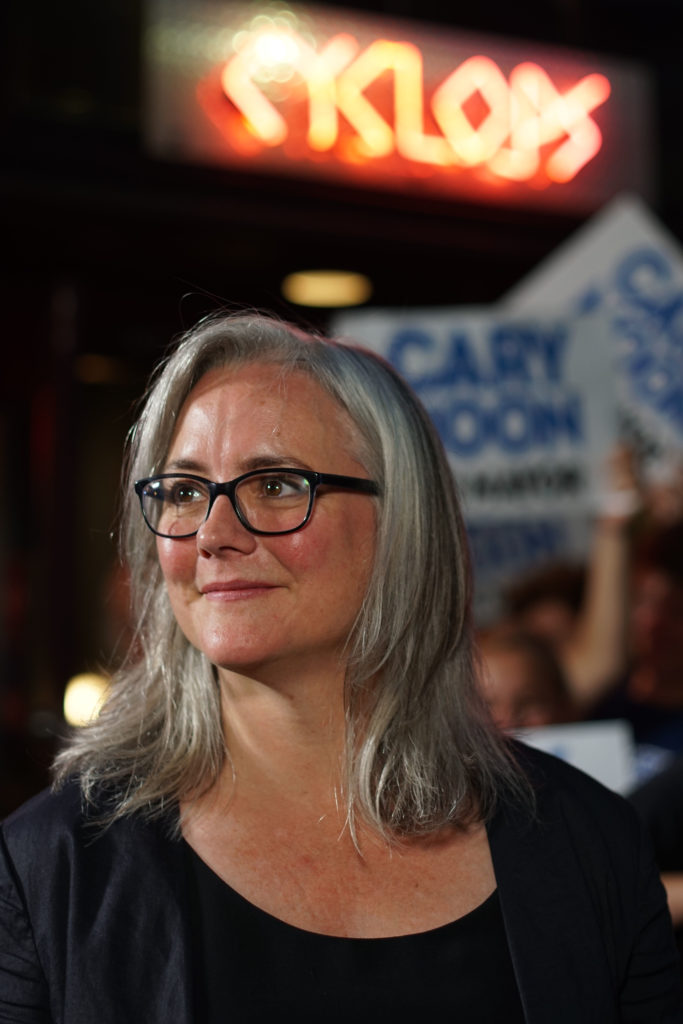In the mayoral race that started with 26 candidates and narrowed down to just two, urban planner Cary Moon officially conceded her run for mayor on Nov. 8, 2017.
Moon’s concession came just a day after Election Day, where after the first ballot drop she was trailing her opponent, former United States Attorney Jenny Durkan, by over 20 percent. After the second ballot drop on Nov. 8, she was still trailing by about the same margin and posted a concession statement shortly thereafter.

Cary Moon made it past the primary election, but ultimately lost to Jenny Durkan in the general election.
“While the election results will probably continue to tighten, the outcome is unlikely to be what we hoped,” Moon wrote in the statement. “We should not let that discourage us. Despite being outspent 3:1, we ran a strong, transparent and honest campaign about vision and solutions. We drove the conversation around housing affordability, real estate speculation, municipal broadband and wealth inequality.”
It was Moon’s dedication to discussing the city’s issues like housing affordability, police reform and homelessness encampment sweeps that drew voters into her campaign. In the preliminary stages of the primary election, six candidates out of the overall 26 grew to be favored to make it to the general election. These included Moon and Durkan, along with Nikkita Oliver, Jessyn Farrell, Bob Hasegawa and Mike McGinn.
Jenny Durkan had been a relative shoe-in for the general election, as she was endorsed by The Seattle Times for her experience in the public service realm as a former U.S. Attorney. Many believed that lawyer and community organizer Nikkita Oliver would secure the second spot in the general election because of her progressiveness and ability to relate to people living in Seattle.
However, after an unexpected endorsement of Cary Moon by alt-weekly newspaper the Stranger, voters became aware of Moon’s progressive ideals as well.
“For her bold housing proposals, firm grasp of Seattle’s most pressing issues, and decades of work fighting to keep the city livable and urban, Cary Moon deserves your vote,” The Stranger wrote in their primary endorsement of Moon. “She’s a bit of a snoozer on the campaign trail—nobody’s picturing Moon pounding her fist on a podium, stirring the youth to action—but what Moon lacks in name recognition and oratorical flair, she makes up for in vision.”
Many believe that the Stranger’s endorsement of Moon instead of Oliver gave Moon the edge she needed to overcome Oliver. However true this inclination was, Moon ended up beating Oliver for the second spot in the general election by just .62 percent, or 1,170 votes.
Eric Sype, Seattle University graduate and former president of the Student Government of Seattle University, had been supporting Nikkita Oliver until the primary election. Sype voted for Moon in the primary election, and believes it is vital that students participate in local politics.
“It’s really important to use the political powers that are given to you, we have a lot of exposure to candidates for high- level offices like mayor that is kind of rare, and I don’t think we really understand how cool that is,” Sype said.
In reality, student voters in Seattle are sparse. The voting districts surrounding the University of Washington and Seattle U have the lowest voter rates in the city, hovering in between 5 percent to 19 percent. This could have contributed to Moon’s loss, as Moon appealed more to younger voters than Durkan.
Following the primary, Moon and Durkan faced off in numerous debates across the city, discussing the city’s pressing issues.
Junior Criminal Justice major Sophie Jensen said that she thought Moon best represented the direction that Seattle should be moving after the debates.
“I prefer [Moon’s] action plans for increasing affordable housing and supporting our homeless population instead of punishing them.” Jensen said. “I like that she spoke out against Murray for abusing public trust and taking abuse allegations seriously.”
As the election loomed nearer, voters began to notice Moon’s lack of morale. This led the Seattle Times to publish an article looking into Moon’s previous employment.
For the past few years Moon had listed her employment as “retired” or “unemployed” on her recent public tax returns. This led the writers to speculate if Moon had run for mayor just to get her name back in the public realm to ease her way back into work, rather than actually wanting to become the city’s mayor.
All of this combined led to Moon’s campaign’s demise—failing to reach the voters that Oliver would have, and failing to reach the more conservative Durkan voters as well.
Anna may be reached at
news@su-spectator.com








